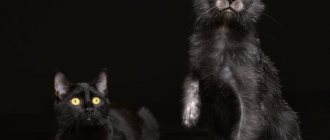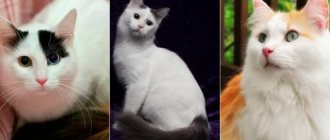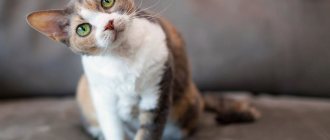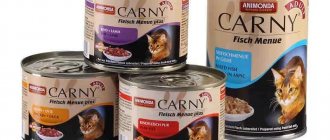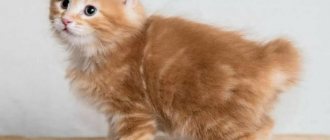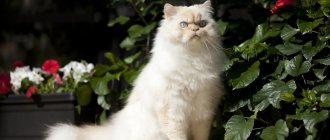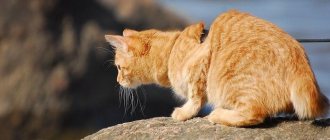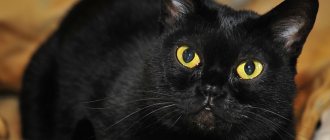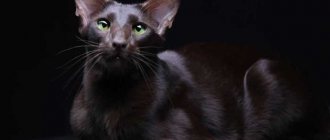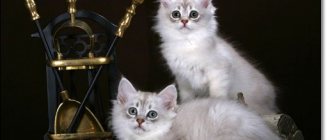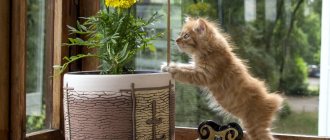History of the origin of the Devon Rex cat
The history of the Devon Rex breed begins in the mid-20th century in England. In the vicinity of Devon County, a stray cat with an unusual appearance was found, which later gave the world healthy and equally remarkable-looking kittens.
At the very beginning, no one could have thought that the newborn offspring, and especially one kitten, were representatives of a new breed. The babies were mistakenly attributed to the Cornish Rex breed, focusing on the wavy fur of one of the kittens.
The photo shows typical representatives of the Devon Rex breed
Subsequently, a Devonshire kitten named Kirley was bred to a Cornish Rex, but the new offspring did not inherit the curly coat of their parent. As a result of long felinological studies, it became clear that Kirli is the proud owner of a unique gene that is responsible for unusual curls. A little later, he was crossed with his mother and sisters in order to consolidate a special mutation.
Devons and Cornish Rexes have long been considered varieties of the same breed. In 1979, the RCA Association officially recognized the existence of the Devon Rex breed, which to this day continues its genetic improvement through crossing with other breeds.
The Devon Rex breed is at the stage of evolution
Breeding
Breeding representatives of this breed should be carried out under the supervision of experienced breeders, since the pets have certain characteristics. Animals have a problem with the compatibility of blood groups, and the slightest error in matching leads to the death of the offspring.
Mating of Devon Rex, carried out under the supervision of specialists, leads to the birth of healthy kittens. Most often, there are no more than 4 cubs in a litter, each of which weighs approximately 100 g.
The pet owner may encounter difficulties not only during mating, but also after the birth of the offspring. If the baby’s blood type does not match the mother’s, then the incompatible antibodies that enter the baby’s body during breastfeeding can kill him. Strong kittens will survive, but at 2 weeks of age the tip of their tail will fall off.
It is recommended to take the cubs away from their mother immediately after birth and feed them with a specialized milk formula for 3 days. On the fourth day you can return the babies to the cat.
Appearance Features
The description of the appearance of the Devon Rex cat breed is particularly shocking: large round eyes contrast with the graceful structure of the body, and locator ears of no less outstanding dimensions are located on the head. It appears to be a real alien, or at least a mythical creature from medieval English folklore.
People call Devon Rex "tailed elves"
Color and coat type
The Devon Rex breed has no coat and has a very short, wavy coat that becomes noticeably thicker on the back, sides, tail and muzzle. On other parts of the body, a significant decrease in hair formation is noticeable, but this is in no way related to baldness.
The photo shows a gray Devon Rex: one of the most common colors of the breed
The breed is characterized by all possible colors: from uniform black and red, to various points.
Anatomical characteristics
The head of the Devon Rex is noticeably expanded and small in size. The muzzle is short, with round cheeks and a prominent chin. The features of the Devon Rex cannot be called round; many representatives of the breed are characterized by sharpness in the outlines of the upper part.
The ears deserve special attention: large and far set, with a wide ear plate. The presence of tassels and a small cover on the outside is also acceptable.
The ears of the Devon Rex are one of the most striking external features of the breed.
The pet's body is graceful, very flexible with fragile bones. Males have the widest chest and shoulders. The limbs are long and slender, with small rounded paws. The tail is long, with a rounded tip.
External defects of the Devon Rex include:
- Strabismus
- Increased shaggy coat
- Frequent and noticeable bald spots
- Tail creases and bends
Dimensions and weight
The breed reaches a maximum weight of 4-5 kg, but despite this their body does not seem too fragile. In some cases, males are slightly larger than females, which is especially noticeable when looking at the structure of the animal’s chest.
Health and breed diseases
Owners of a Devon Rex cat may encounter the following hereditary diseases of the breed:
- Hip dysplasia.
- Possible dislocation of the kneecap.
- Impaired muscle function (myopathy).
- Hypertrophic cardiomyopathy (heart disease)
Despite possible diseases, the breed is exceptionally strong and healthy.
Felinologists say: “If a Devon survives the first 2 months, then nothing is scary for him.”
This is due to the fact that kittens may have incompatibility of blood type with their mother’s. In this case, the cubs cannot be fed with colostrum and must wait out this period. Otherwise, the litter dies in the first couple of days. To avoid such situations, animals participating in mating are given a blood test and checked for compatibility.
The life expectancy of Devon Rex is quite long - with proper nutrition and care, the cat will live with you for 15-18 years.
Hypoallergenic
A Devon Rex cat that is not hypoallergenic: unfortunately, this is a persistent myth and deception, which is used for selfish purposes by unscrupulous breeders. The breed is allergenic in the same way as many other felines, which people with vulnerable immune systems should be prepared for.
The hypoallergenic nature of the breed is a long-standing misconception
And although Devons do not shed intensively, their fur is by no means sterile, and in their saliva, like most cats, there is the protein Fel d1, familiar to all allergy sufferers, which causes teary eyes and sneezing.
Feedback on habits and behavior
Igor, the owner of the cat Kerry , like many others, notes that his pet “all the time tries to get closer to the owner’s face: he settles on the neck like a collar, looks into the eyes.”
This behavior is quite understandable. After all, Devons really need affection and tactile sensations - their well-being and mood directly depend on this. Therefore, whenever possible, they will come into contact with you, expecting a response.
Owners leave amazing reviews about the special intelligence of their curly pets. Many compare them to dogs. It’s not surprising - after all, these representatives of the feline family learn quickly and are easy to train.
It’s a little strange to look at a cat that responds to its name, brings toys in its teeth and even follows some commands.
Elena says that her ward Dominika happily responds to the commands “apport!” and “serve!”, knows her name, wags her tail like a dog and growls when you take her toy away. Why not a dog?
Many owners notice habits that are completely atypical for cats. Some talk about the rich facial expressions of Devons, saying that they can smile, frown, squint offendedly and even “make eyes.” Others are shocked by mobile cat fingers that can open any door or lock, press a button on a television remote control, or turn on and off the lights.
Devon Rex character
The semi-mystical appearance of the Devon Rex casts upon them a fog of mystery and detachment from the world around them. It seems that such a cat will be the missing addition to the count's Victorian-style mansion. In fact, they are very domestic and sociable pets that have a strong bond with people.
IMPORTANT: many breeders note that Devon Rex dogs are annoying. You need to prepare for this before purchasing the breed.
The devotion and sociability of Devons knows no bounds: they will follow their owner literally everywhere, softly purring to remind them of their presence. The Devon Rex cat loves to spend time on the laps and shoulders of the owner, meet them at the door and accompany them on any trip (even to the restroom or bathroom). Devon Rexes do not like and do not know how to properly use themselves in conditions of loneliness - this causes them stress and subsequent negative changes in character.
Devon Rexes are very playful, active and inquisitive.
It is worth noting the natural hypertrophied curiosity of the Devon Rex, which deftly wields its small paws and opens all available doors. They explore everything their little body can penetrate and don’t be surprised if you find this alien somewhere you don’t expect.
Every centimeter of an apartment or house will be thoroughly sniffed by the Devon
IMPORTANT: the nature of the Devon Rex allows them to treat children kindly and patiently, but still you should not insist on the cat communicating with the child. By nature, they prefer to spend time with adults than with children.
Cats of this breed are very friendly towards other pets and are not at all jealous. Their sociability and childish carelessness will appeal to many; besides, Devons do not know how to show aggression towards others.
Reviews
miv
The character is a miracle, about vindictiveness - this is not about the Devons at all. Devons love people madly, love to play pranks, and never remember an insult. It’s impossible to scold Devon, but still, if you have to make a suggestion, in a minute he’ll be back with you like a tail, they’re not touchy. But they like to consider themselves the main ones in the family, with properly built relationships, you are the main ones in the house, everything is wonderful. And about the smell and dirty hands, that’s not true. Unless, of course, you don’t wash the cats at all, this also happens; well, it will probably be unpleasant to pet any breed. Devons do not smell if they are looked after properly. I don’t know a smarter breed or a stickier breed. It’s strange to read this about cats; in the Devons, the cats will love you to the point of obsession at times, constantly asking to be held and climbing on your arms like monkeys in a circus. Lately, some negative reviews have begun to appear about girls, but I believe that it all depends on the conditions in which the kitten grew up, how much time they interacted with him while he was growing up, and how they communicated. The girls will still come, but do you think there would be so many people suffering from devomania if they were so bad in character, vindictive and it would be unpleasant to pet them? As a rule, breeders observe a different picture: where one girl settles, after a while a second one appears, delays this matter, and they take him for his extraordinary character, and of course his incredibly beautiful appearance.
nateana
It’s very strange to read about the unpleasantness of Devons... I, for example, due to my workload, did not suffer from frequent bathing of Devons, but they always told me that they either smell very pleasant (something like perfume, apparently they take on the smells of the house), or, on the contrary, they were surprised that cats don't smell at all. Precisely cats, and not in the absence of smell in the house... Although they often talk about this in surprise... well, I don’t even want to answer about “vindictiveness”... this is not a Devon... P/S/ don’t consider it a pervert, but even if Devons smell, it’s very nice... some kind of buns or something... after sleep... or kittens... In my practice, people’s lives and worldviews changed for the better - Devons are faster than psychotherapists in getting rid of depression...
Egoza
I fell in love with Devons at first in the picture, then I saw them live and fell in love with them! Their character is wonderful! The girls are very affectionate, they always “migrate” behind you (they don’t get under your feet), it’s just which room you’re in and they get along great with all family members and guests. Each cat has its own unique charisma; they have a pleasant and melodious voice. And how smart they are! As for the dirty hands after them, it actually made me laugh! They have fur and need to be bathed from time to time...Have you ever petted a Devon, Selena0810?...It’s like ironing velvet, a broadtail skin...you will never forget a Devon’s skin and never confuse it with anything! You write that this woman’s daughter is a veterinarian, so there is no doubt that the animals received proper care. Care is one thing, but love is another! Do you notice the difference? I agree with Larisa that a lot depends on the conditions in which the animal was kept and raised. Devons love attention and simply need it, they listen well and respond in return. These are cats and dogs... Cats in this breed generally love people so much! They will caress, crawl under your arm and look into your eyes, constantly asking you: “Mom, do you really love me?” And I love you so much!” Each person has his own character, each is individual, but each has his own animal. I used to have British cats, they are beautiful, imposing, not intrusive, beautiful in the interior..)…… but this is not my thing! Now, having girls, I realized what a happiness it is when they are nearby! These are my cats. We live in the same rhythm! Listen to yourself and listen to yourself, go to exhibitions, look, pet... It’s true what they say, every cat has its own person..
Video
Care
The specificity of the conditions of detention lies in the curious nature of the Devon, which is especially true for the Devon kitten. This is not an exaggeration, since reviews from many owners described situations that could cause significant harm to the pet’s health. Devons can easily sneak into an aquarium with fish or hang on a windowsill while studying birds and insects.
IMPORTANT: the mobility of the Devon Rex remains for many years, until the onset of extreme old age. Older cats play with toys no less actively than young cats.
- Adult Devons become a little more reserved, but kittens tend to explore everything they can and cannot. Purchasing a kitten will require the owner to clear the premises of unsafe heights, small and sharp objects, and other objects that could cause harm to the animal in the process. Alas, this is the reality of this breed and you have to come to terms with it.
Loopholes and toys in large quantities will be able to distract the Devon’s attention from unsafe entertainment
- The Devon Rex will also need the standard equipment of any cat - this is a bed, a tray, litter, scratching posts and bowls. It would be the right decision to purchase a multi-level complex for your playful cat, which will help distract him from climbing all over the house.
- The diet is the basis for the proper maintenance of any pet. Balanced and nutritious food will maintain health and prolong the life of the animal.
- Once a week, you need to brush your teeth with a silicone brush with a special paste, which can be purchased at any veterinary pharmacy.
- Your pet's nails can be trimmed no more than once a month.
- Once every two weeks you need to wipe your pet’s ears and eyes with a damp cloth. You should handle the ears very carefully: the wide surface of the auricle is very fragile in its structure, you should not press or pull it, so as not to cause pain to your pet.
Devon Rex ears require regular and careful care.
- Vaccination, treatment for parasites and preventive examinations every six months will allow you to always be aware of your pet’s health.
IMPORTANT: cats of this breed are very jumping, all mezzanines and hills in the house will be studied and will become regular entertainment for the Devon Rex.
Care and maintenance.
Caring for the coat of a Devon Rex is no different from caring for the coat of any other cat. Pets should be combed as needed - mainly during mild shedding.
For any animal in the house you need to have separate bowls. If you feed your cat store-bought food, then you should allocate three bowls: for dry food, for canned food and for water. The depth should be average, since the Devon Rex is small. Bowls should be washed as needed.
A scratching post is a necessary element in the life of any cat. Experienced owners advise purchasing vertical scratching posts “for growth” so as not to change them every few months.
It is not a fact that the pet will sleep in the place allocated to it. You can buy ready-made structures at a pet store, where the sleeping place and scratching post are located on several tiers. There the cat will periodically doze off, but at night it will most likely come to its owner to sleep, and it will be simply impossible to kick it out.
Ear and eye care is carried out infrequently, but regularly (about once a week). You can easily purchase special wipes at a pet store - they are ideal and will not cause inflammation. Do not use alcohol, oils or other products under any circumstances; all this will only harm your pet.
Devons also need to have their claws trimmed. To do this, buy special rounded scissors at a pet store; regular scissors will not work - they peel off the nail plates. You need to cut carefully, not going further than 5-6 millimeters from the tip of the claw. The space under the claws also needs to be cleaned - this is where the Devon Rex accumulates a large amount of dirt and grease. In fact, the process is quite simple; you just need to get used to it from childhood. “Manicure” and cleaning of the claw space should be done once every 10-15 days.
Dental care should not be overlooked - without it, the pet is at risk of developing plaque, caries, etc. Once a week, using a bandage wrapped around your finger or a pet brush with zoopaste, you need to carefully walk over the Devon Rex’s teeth. Instead, you can use special chewing treats designed for cleaning teeth.
If you buy a pet from a good breeder, then by the time of purchase the kitten will already be litter box trained. Of course, in a new home, it will be more difficult for the animal to adapt to a new place to go to the toilet. To do this, the breeder will definitely give you the filler that he used while the pet was with him, and this will make the habituation process easier.
In general, caring for and maintaining a Devon Rex is not considered difficult or troublesome. The main thing is to accustom the kitten to hygiene procedures from an early age.
What to feed your Devon Rex
The breed’s diet includes exclusively premium food and canned food that can supply the Devon Rex’s body with the necessary vitamins and minerals. It is also recommended to feed your pet with natural products:
- Lean lean meat, which should first be doused with boiling water
- Sea fish no more than once a week
- Boiled cereals and vegetables
- Low-fat fermented milk products
It is necessary to ensure a high calcium content in the diet, which will help strengthen your pet’s bones.
Completely excluded:
- Salt, sugar
- Bakery
- Sweets
- Smoked meats
- Pickles
- Liver
- Pure milk
- River fish
- Fruits
Is it okay to let Devon Rex dogs eat as much as they want?
This question is partly justified. The fact is that, firstly, Devon Rexes are very active breeds of domestic cats. This, of course, increases their energy costs, which must be replenished. Secondly, the Devon Rex's coat is very thin and therefore it has to expend more energy to maintain body temperature, which in turn, again, requires compensation in the form of food.
Devon Rex cats are very active cats and their energy expenditure is higher.
Therefore, the standard dose of food for such cats should be increased slightly, but, of course, not so much that it leads to obesity. The same can be said about the amount of natural food, although in this case it will be somewhat more difficult to calculate the norm. In this case, you can seek advice from a veterinarian or the breeder from whom the kitten was purchased.
Pay due attention to kitten nutrition
It must be remembered that until the age of four months, Devon Rex cats should be fed four times a day. For kittens from four to ten months, the number of meals can be reduced to three, and for adult cats, two meals will be enough: morning and evening.
Breeding Devon Rex
Reproduction of representatives of the breed goes through a number of difficulties that are associated with the blood type of the animals. Most often, one blood type predominates among the breed, which allows for smooth mating between animals. In the case of the Devon Rex, males and females may have incompatible blood types. If a cat has group A, and a cat has B, there is a high probability of getting sick and even stillborn offspring.
Currently, mainly American Shorthair and British cats are used for mating.
In general, Devon Rex pregnancy proceeds without complications within the prescribed period of 63 days. At this time, the cat should receive maximum care and attention; the animal’s diet increases by 20% and, after the expiration of the period, remains for the entire lactation period. If the mating partner is chosen correctly, pregnancy will occur immediately.
At the moment, breeding is limited, so finding a suitable mating partner is not an easy task.
Features of mating and breeding
The optimal age for a cat for the first mating is 10–15 months, for a male cat - 12 months. It's okay if the cat has already gone through 2-3 heats. By this age, the cat’s body becomes more prepared for pregnancy.
Devon rexes bear kittens for 65–66 days. Pregnancy and childbirth itself are usually easy. 3–4 kittens are born in one litter. If a cat is purchased for the soul and breeding is not planned, then it is better to castrate or sterilize the animal. To do this, you must wait until puberty is complete. The optimal age for castration or sterilization is 9–10 months.
Sterilization refers to tubal ligation in cats and ligation of the seminal ducts in cats. Castration is a different kind of operation. When castrating cats, the ovaries are removed along with the uterus (ovariohysterectomy) or only the ovaries (oophorectomy). During castration, both testicles are removed in cats.
When breeding, breeders need to take into account the peculiarity of the Devon Rex breed - the presence of two types of blood groups (A and B). The health of cats with different blood types is no different, but when breeding such animals, newborn kittens may suffer. Kittens with type B blood will be incompatible with a mother who has type A blood, and vice versa. Antibodies secreted by the body of a mother cat are contained in her milk in the first hours after the birth of babies. If such milk enters the kittens’ body, they may die, as the process of destruction of red blood cells in their blood will begin.
In total, cats have 3 blood types - A, B and AB. The most common animals are those with A-blood. These are mainly breeds of eastern origin (93–98%). Among British Shorthairs, Cornish Rexes and Exotics, type A blood is found in 60–80% of animals; in other cases, animals have type B blood. Type AB is extremely rare. Among Devon Rexes, two blood types occur, most likely due to past inbreeding with British cats. 40–50% of Devons have type B blood, and 50–60% have type A blood.
Some breeders try to determine the blood type of animals before mating in order to avoid problems after the kittens are born. There is a simpler way to save animals from death. In the first 16–20 hours after birth, feed the kittens artificially or, if there is a nursing cat with the required blood type, then feed the babies to her.
In search of a suitable pair for mating, breeders go to exhibitions. When choosing an animal, you need to familiarize yourself with its pedigree. The breed is quite young and in most cases the pedigree can be traced almost back to Kirli itself. Pedigree cats must participate in exhibitions and receive marks at them.
Most breeders enter into a contract when breeding animals. It states:
- information about the vaccination of both animals,
- information from pedigrees, achievements of cats,
- conditions for completing and paying for the transaction,
- conditions for distribution of kittens.
Kittens at the age of 2 months are registered in the club. This can be done before the animals reach six months. Upon registration, a breeding certificate is issued for the litter, and kittens are given birth certificates. When purchasing a kitten, the new owners are given the metric in their hands. Based on it, they can order a pedigree for the animal from the club. The breeder himself can do this.
Advantages and disadvantages
The Devon Rex is an unusual breed that has its own advantages and disadvantages. Among the advantages, we highlight the most outstanding:
- Loyalty is the strongest trait in the Devon character. He is sincerely faithful to his owner and will be an excellent companion for lonely people.
- The unusual appearance will be a gift for lovers of exotic breeds and pets. In addition, their appearance will be the subject of admiration from friends and family guests.
Most of all, Devon Rexes love to spend time next to their owner.
- Devon will easily fit into a large family and will be everyone's favorite. Moreover, he will never offend or bite a baby, and will not enter into a fight with other pets for dominance in the house.
- The breed is in good health and is not prone to illness. Visits to the veterinarian will be more preventative than urgent.
Among the disadvantages of the breed:
- Immense curiosity that demands close attention. This pet, as they say, needs “an eye and an eye,” and this is a task for young and active breeders.
- Devon Rexes do not like and cannot be left alone for long periods of time. This circumstance can complicate the lifestyle of those people who go on business trips for a long time and often.
Unfortunately, the loneliness of the Devon Rex cannot be alleviated by an abundance of treats and toys.
Advantages and disadvantages
Among the advantages of this breed it is worth highlighting:
- non-standard appearance;
- good health;
- low maintenance requirements;
- friendliness;
- easy to learn.
One of the disadvantages of the breed is their excessive mobility, which can lead to injury. The downside of Devon Rex is that they have a hard time being separated from their household. Leaving your pet alone for a long time is not recommended, as this will lead to psychological trauma.
How much does it cost and how to choose a kitten
The price for a Devon Rex kitten reaches $200-500; defective representatives of the breed without a pedigree can cost a little less.
- A nursery with a good reputation is registered in any felinological system and has verified regular customers.
- It is best to come to the nursery and personally assess the living conditions of the animals. As a rule, a conscientious breeder follows all recommendations, and the animals live clean and well-fed.
A professional breeder pays a lot of attention to litter care
- A pet’s veterinary card is an indicator of the breeder’s integrity. Upon reaching the age of three months, all vaccinations must be observed and the necessary veterinary examinations must be carried out.
- The kitten must be healthy, without external defects, special attention should be paid to the ears: they must be clean, without wounds, crusts or plaque.
- If a kitten has a tight and hard tummy, this is a bad sign indicating the presence of worms.
Where can I buy and cost?
In Russia, the Devon Rex is rare. There are few nurseries and breeders of this breed, so the cost is rather high. A kitten with documents and pedigree will cost approximately 40,000 rubles.
The price is affected by the color and type of wool: if it is curly and there is a rare shade, then the cost increases to 50,000 rubles.
If a kitten was born from a random mating and does not have documents confirming its purebredness, it can be purchased for 20,000 rubles.
However, no one can guarantee that the animal does not have defects or congenital pathologies.
You can purchase Devon Rex from specialized nurseries or breeders. Addresses are verified via the Internet. You can also order a kitten on various sites on the World Wide Web. However, this is not safe; there is a possibility of running into scammers.
The Devon Rex is a playful and energetic cat breed. He needs constant attention. Suitable for families with many people. There should always be someone next to him. You won’t be bored with an animal; it will brighten up the life of its owners.
How to distinguish a conscientious Devon Rex breeder from an unscrupulous one?
First of all, you should pay attention to the price at which the breeder sells its kittens. A serious breeder will never go below $300. Yes, and she looks quite dubious. Good breeders sell kittens with higher characteristics for $1,000, those with less pronounced characteristics for 500-700, and the best ones are not sold at all, leaving them for breeding work. Remember: for a breeder, the main goal is successful breeding work, and not participation in exhibitions and especially not money. This, admittedly, considerable money that they demand for kittens, for the most part is needed only to compensate for the costs associated with keeping animals, as well as related costs, such as, for example, veterinarian services, exhibitions, trips, etc. It is no coincidence that the bulk successful breeders have other sources of income. Another sign of a good breeder: a reluctance to sell their pets to just anyone. A good breeder will require a personal meeting, and only when he is sure that his pets will end up in good hands will he agree to sell them.
Give your pet as much time as possible, and he will not remain in debt
Another sign is the presence of an officially registered nursery, which must be a member of one or another club, which in turn must be part of one of the recognized felinological organizations. Pay special attention to this point: there are a lot of felinological organizations in the world of dubious quality, so a club consisting of one of them, as well as the reputation of a breeder who for some reason decided to register in such a low-quality club, themselves raise doubts.
If you find an error, please select a piece of text and press Ctrl+Enter.
Feeding
This breed is not picky about food, so these animals can be fed both natural food and special feed.
The main thing is not to give them too fatty and salty, this can negatively affect the digestive system. As for the second option, it is better to choose high-grade feed.
Appearance and description of the Devon Rex breed
According to its description, the Devon Rex is a bit similar to the Cornish Rex breed, and many people confuse these two types of pets. However, each species has its own distinctive features.
Note!
Norwegian Forest Cat - description of the breed, character, habits and maintenance of the Norwegian (110 photos and videos)- Cat litter - detailed review, prices, how to choose, where to buy
Ragdoll - 110 photos, breed description, price, character and owner reviews
The animal's head is in the shape of a triangle with a short muzzle, large eyes and cheekbones. The huge ears are set lower than usual, and the nose is directed upward.
The cats have a stocky, medium-sized build. Their legs are long, thin and strong, and the hind legs are slightly longer than the front ones. The chest is wide. The weight of an adult cat can reach up to 4.5 kg, and that of a female cat up to 3.2 kg.
The color of the Devon Rex can be completely different, so they do not have a standard as such. But the pet’s fur is a striking distinctive feature. It is short, wavy and soft to the touch. The muzzle, sides, back and thigh area have longer hair than the rest of the body.
Sometimes hair may be missing, but this factor is rather considered a disadvantage. On the Internet you can find photos of Devon Rex of various colors.
